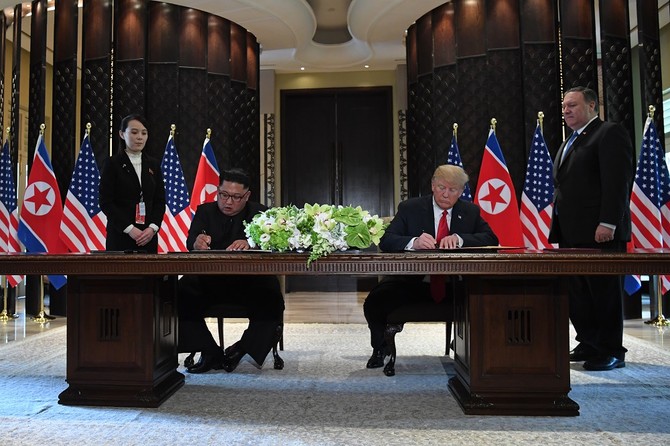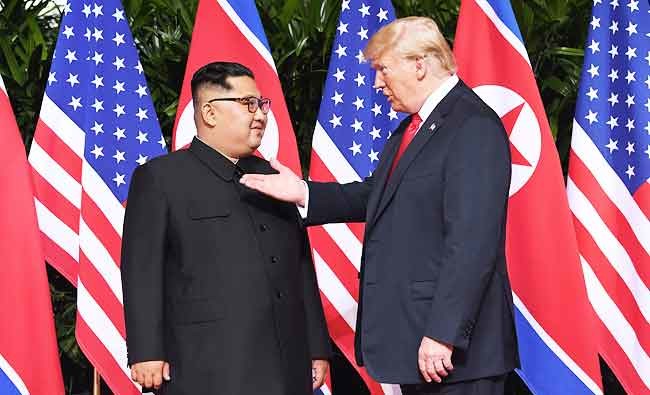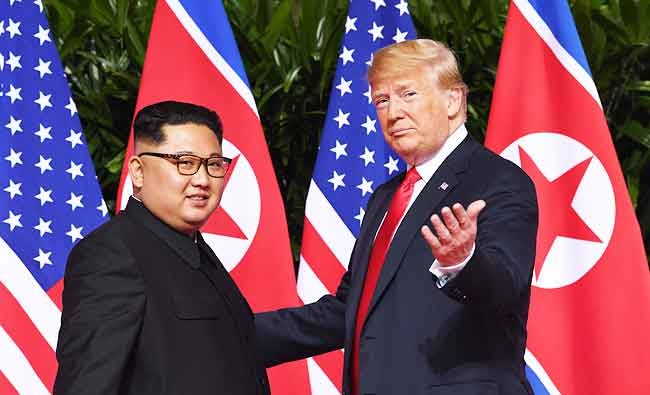SINGAPORE: US President Donald Trump has confirmed that North Korean leader Kim Jong Un has agreed to “an unwavering and complete denuclearization of the Korean peninsula,” although there is no clear deadline for nuclear disarmament.
He made the statement during a press conference at the Trump-Kim Summit in Singapore on Tuesday.
The summit at a luxury hotel on the island of Sentosa saw the two leaders expressing their commitment to “vigorous negotiations to implement the agreement as soon as possible” at their first meeting.
Despite being quizzed by journalists several times, Trump was unable to give a clear deadline or a clear process of denuclearization.
However, Trump said that North Korea had already destroyed a major missile engine testing site and that it has not had a nuclear test for the past seven months. “When he lands, he would start the denuclearization process right away,” Trump told reporters.
Keith Fitzgerald, negotiation and conflict management expert and managing director of Sea-Change Partners, commented: “The Trump White House has not shared much information about their plans. If the White House had a strategy, it’s not clear to most analysts what that strategy was.”
Professor James Chin, director of the Asia Institute at the University of Tasmania, agreed that the only strategy the denuclearization talks involved is “the willingness to compromise.”
— Donald J. Trump (@realDonaldTrump) June 12, 2018
“There will not be a comprehensive agreement, but it will be more like a roadmap to agreement, and perhaps a statement on the end of war,” added Prof. Chin.
Trump’s negotiating style is guided more by “his personal instincts” than by any strategy, added Fitzgerald. The Trump-Kim talks had gone from words about “complete, verifiable, irreversible denuclearization” to talk of making a good start, as the summit approached. Trump praised Kim for taking “the first bold step for a bright full future,” adding that the meeting with the North Korean leader was “honest, direct and productive.”
“He is very talented,” said Trump, adding that 26-year-old Kim was able to “run it tough.” North Korea is infamous for its human rights atrocities, including running a state-sanctioned gulag against its own citizens.
“He wants to do the right thing,” said Trump, adding that human rights were part of the discussion despite being discussed “relatively briefly”. In its 2018 report the Human Rights Watch described North Korea as “one of the most repressive authoritarian states in the world.”
Trump told reporters that both leaders will pay courtesy calls to each other’s respective countries “at the appropriate time.”
“It is a strange thing to see an American president have better relationships with North Korea and Russia than with Germany and Canada,” Fitzgerald told Arab News.
Before Trump’s press conference took place, a sleek, propaganda video resembling a big-budgeted Hollywood trailer was shown hailing Trump and Kim as heroes who would “advance” North Korea.
The video was made by a Los Angeles-based, award-winning production house Destiny Pictures, and commissioned by the US government.































